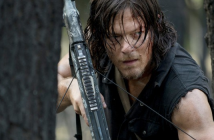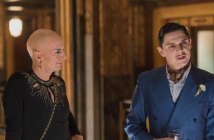April 19, 2015, 9:00 p.m. (EST), HBO
One of the things that makes Game of Thrones, and A Song of Ice and Fire before it, so compelling is that, for all of its fantastic elements, the show’s politics always feels like it takes place at human scale. This isn’t to say the political figures are in touch with the needs of those they govern, or even necessarily care whether their decisions from thrones affect the peasants who toil under their rule. Yet the conflicts that arise, the way they are addressed, and the consequences of political actions on the show always tend to feel incredibly grounded, deeply tied to the world and the people who struggle to rule it.
There’s a brutal realism to Dany’s decision to execute the man who kills the Harpy, and to the lessons she hopes to teach in that moment. She is struggling to unite a society that previously consisted of masters and servants, to convince people fighting to regain their dominance or struggling to maintain their autonomy to look at one another as equals under a newly forming political order. So she chooses not to kill the Harpy, but to put him on trial, to show Meereen that justice, not power, will be the new guiding force in their lives. When the man kills the Harpy, Dany feels she has no choice but to kill the vigilante. It is what justice requires. It is how the scales can be evened out. Yet she misses the greater complexity of the situation; she fails to grasp how deeply flawed the scale on which she attempts to balance has become, how twisted the old order has left things. She won’t win back the Masters or stop their reign of terror as Harpies by killing this former slave. She has taken everything from them and refuses to give it back. She will always be seen as an enemy, an obstacle to the society that once gave them everything and asked for nothing in return. Nor, however, can she possibly hope to win over former slaves by killing one of their own. These are a people who have been oppressed and imprisoned, traded like they were lower than dogs, kept from freedom or power, denied their agency at a base level. Killing one of them just shows the rest of the newly freed people that their Mhysa is throwing in with the Masters. It’s just more evidence that power corrupts, and that any system will ultimately be turned against them. Dany’s intentions are noble, her actions harsh, but fair. Yet politically, what she does is a disaster, making thousands of enemies while winning zero friends, and turning a fraught city into an open battlefield, a cacophony of riots unlikely to quiet soon.
On the road to Volantis (and, really, The Road to Volantis is what we are calling this subplot so long as Varys and Tyrion are Hope and Crosby-ing their way across Essos), Varys discusses Tyrion’s brief rule, and it is clear that both think Tyrion was an excellent ruler in every respect but one: He lacked, and could never hope to earn, the love of the people. The shared tragedy of Varys and Tyrion is that no one will ever truly respect their value because they are seen as somehow lesser by their society. Both are political geniuses with the necessary combination of empathy and acumen required to be a ruler who both aims at righteous goals, and knows whose bones to break to achieve them. They would both be heroes of a story that wasn’t cognizant of the way society tends to limit those it does not understand or value. They are brilliant, compassionate, dedicated men whom the world has cast out of its good graces. They are fleeing from a rotten system that won’t give them the chance they deserve, and hoping to find something better to the east, where Danaerys Targaryen is trying to form a government focused on justice and merit rather than oppression and bigotry. It’s a wise political move, but also, it’s a sign that neither man has given up hope, even after weathering all that they have. Both believe that somewhere, out there, is a person who will understand what they offer and will let them serve a noble cause again, in the way they do it best, without being viewed with suspicion for simply being who they are.
This notion of how identity defines and limits us runs through “The House of Black and White,” from Tyrion and Varys’ conversation to Gilly and Shireen’s conversation, where two women who have been labeled and marked by experiences beyond their control find a place of acceptance with one another, even as the world threatens to tear them apart and keep them down. It’s impossible not to consider this quandary when looking at Brienne, whose tragedy matches that of Varys and Tyrion. She is a strong and loyal fighter, who is mocked and excluded based only on her gender, kept out of a role that would be hers in spades were she a man, and forced to forge her own way in a world that doesn’t particularly want her. She is rejected by both Stark girls, in turn, but she has been rejected enough in her life time that she will not be deterred. There is more than that to Brienne’s resilience, of course. She is a woman who has dedicated her life to serving Great Men (and women, but the term as I use it is intended as a blanket), in large part so that she never has to worry about thinking for herself. Find the right person to swear your sword to, and you can live a noble life, even if it is a somewhat unthinking one. But if Brienne gives in and admits that she has failed the memory of Catelyn Stark, she has no one left to serve. She has built an identity out of a combination of loyalty and a refusal to be pigeon-holed by expectations, but if she abandons this quest, she is loyal to no one, and every bit the failure Littlefinger claims she is when he besmirches her to Sansa.
This notion of identity is perhaps best expressed in Arya’s storyline. She arrives in Braavos and at the House of Black and White, only to be turned away. When she says she has nowhere else to go, the man at the door tells her “you have everywhere else to go.” The journey Arya is on is about to take her, in a very real sense, away from the identity she has formed for herself and towards a greater understanding of what it means to live in the world. Yet there are limits to how far one can travel away from themselves and their past. We always have the choice to change, the ability to let go of old pain and let ancient wounds heal. But that work is hard, and the past has a way of sticking with us long after we might want to let it go. There’s a temptation, already, that the House of Black and White will let Arya change her appearance and remove the various societal obstacles her place as a woman in a deeply misogynistic world has placed upon her. But a mask doesn’t change what’s underneath it. You could disguise Varys or Tyrion, Shireen or Gilly, Brienne or Sansa or Arya. But you can never take away their understanding of what it means to live in a world that doesn’t want to give you a place at the table, of how it feels to be denied for a very fact of your being, of what it is like to be kept from achieving all that you might due to the simple-mindedness of the world you were born into. There’s no question that this is what makes these people have value. It is what gives them their own perspective separate from a herd mentality, and separate from the patriarchy that rules over Westeros for the moment. There’s no doubt that Tyrion would have advised Dany against doing what she does tonight. There’s no doubt that Game of Thrones operates on a system much like our own, where the power of the past exerts a strong toll on the present, and where those in positions of authority will do anything to retain that authority, will cast out the powerless and bar the doors. “The House of Black and White” is smart about the way that politics is inevitably intertwined with the identity of those involved in it, and about the way that identity shapes the politics of those who grow up in a system like this. It’s a dark mirror pointed directly at our own society, a if to ask us who we are, and who we might want to be.
The Roundup
- “Ready the horses.” “We only have one horse.” “Find more!”
- “Are we really going to spend the entire road to Volantis talking about the futility of things?” “You’re right, no point.”
- “Show to much kindness, people won’t fear you. If they don’t fear you, they won’t follow you.”
- SPOILERS: We get our first glimpse of Dorne tonight, albeit a short one that places Ellaria Sand in the shoes of Obara Martell. It makes sense to me that the show is condensing the Sand Snakes a bit, although the lack of focus on Dorne so far is disappointing. As a defender of A Feast For Crows for the way it expanded the world and provided us with a lot of insight into two under-seen cultures (Dorne and the Iron Islands), I am disappointed the show seems to be shunting Dorne into a small subplot and ignoring the Iron Islands entirely. This episode makes it almost blatantly clear that Greyscale, and Tyrion’s potential exposure to it, will remain parts of this story going forward, and Jon’s election as Lord Commander puts him on the road to the fate that awaits him. Also, Kevan Lannister is here, and we all know how that will turn out.
“The House of Black and White” is smart about the way that politics is inevitably intertwined with the identity of those involved in it, and about the way that identity shapes the politics of those who grow up in a system like this.
-
GREAT




